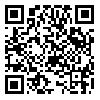Volume 12, Issue 3 (May & Jun 2022)
J Research Health 2022, 12(3): 185-192 |
Back to browse issues page
Download citation:
BibTeX | RIS | EndNote | Medlars | ProCite | Reference Manager | RefWorks
Send citation to:



BibTeX | RIS | EndNote | Medlars | ProCite | Reference Manager | RefWorks
Send citation to:
Kordzanganeh Z, Bakhtiarpour S, Hafezi F, Dasht Bozorgi Z. Mediating Role of Self-efficacy Beliefs in the Relationship Between Family Emotional Climate and Time Management With Academic Stress in University Students. J Research Health 2022; 12 (3) :185-192
URL: http://jrh.gmu.ac.ir/article-1-2019-en.html
URL: http://jrh.gmu.ac.ir/article-1-2019-en.html
1- Department of Psychology, Ahvaz Branch, Islamic Azad University, Ahvaz, Iran.
2- Department of Psychology, Ahvaz Branch, Islamic Azad University, Ahvaz, Iran. ,bakhtiyarpours@gmail.com
2- Department of Psychology, Ahvaz Branch, Islamic Azad University, Ahvaz, Iran. ,
Abstract: (4666 Views)
Background: Students’ minds fail to quickly analyze the mass of information to which they are exposed when experiencing academic stress, resulting in irreparable physical and mental damage. The present study aims to investigate the mediating role of self-efficacy beliefs in the relationship between family emotional climate and time management with academic stress in university students.
Methods: This is a correlational-descriptive study conducted with path analysis. The statistical population consisted of all male and female students of Islamic Azad University of Ahvaz in the academic year of 2019-2020, of whom 222 students were selected as the sample via the convenience sampling method. The research instruments included the educational stress scale, the family emotional climate questionnaire, the time management scale, and the self-efficacy scale. The proposed model was evaluated by Structural Equation Modeling (SEM).
Results: The results revealed a significant relationship between family emotional climate and academic stress (β=-0.57, P=0.001), family emotional climate and self-efficacy beliefs (β=0.27, P=0.001), time management and self-efficacy beliefs (β=0.23, P=0.001), and self-efficacy beliefs and academic stress (β=-0.15, P=0.007). However, no significant relationship was found between time management and academic stress. The results also indicated that self-efficacy beliefs could significantly mediate the indirect relationship between family emotional climate and academic stress (P=0.016), and also the relationship between time management and academic stress (P=0.017).
Conclusion: Study findings confirmed the proposed model’s goodness of fit; therefore, the model can be employed to effectively identify the factors causing academic stress in university students.
Methods: This is a correlational-descriptive study conducted with path analysis. The statistical population consisted of all male and female students of Islamic Azad University of Ahvaz in the academic year of 2019-2020, of whom 222 students were selected as the sample via the convenience sampling method. The research instruments included the educational stress scale, the family emotional climate questionnaire, the time management scale, and the self-efficacy scale. The proposed model was evaluated by Structural Equation Modeling (SEM).
Results: The results revealed a significant relationship between family emotional climate and academic stress (β=-0.57, P=0.001), family emotional climate and self-efficacy beliefs (β=0.27, P=0.001), time management and self-efficacy beliefs (β=0.23, P=0.001), and self-efficacy beliefs and academic stress (β=-0.15, P=0.007). However, no significant relationship was found between time management and academic stress. The results also indicated that self-efficacy beliefs could significantly mediate the indirect relationship between family emotional climate and academic stress (P=0.016), and also the relationship between time management and academic stress (P=0.017).
Conclusion: Study findings confirmed the proposed model’s goodness of fit; therefore, the model can be employed to effectively identify the factors causing academic stress in university students.
Type of Study: Orginal Article |
Subject:
● International Health
Received: 2021/11/8 | Accepted: 2022/01/15 | Published: 2022/05/1
Received: 2021/11/8 | Accepted: 2022/01/15 | Published: 2022/05/1
| Rights and permissions | |
 |
This work is licensed under a Creative Commons Attribution-NonCommercial 4.0 International License. |









